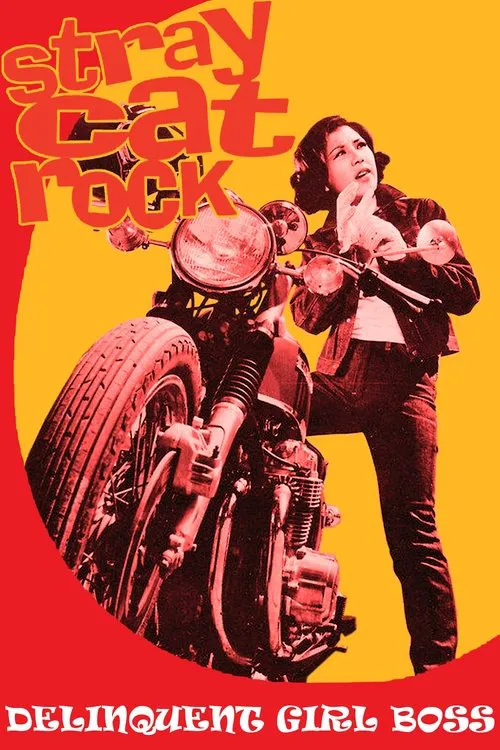Stray Cat Rock: Delinquent Girl Boss

Plot
Stray Cat Rock: Delinquent Girl Boss is a 1970 Japanese film directed by Tetsurō Tsugawa and is the fourth installment in the Stray Cat Rock series. Set in the vibrant 1970s, the movie follows the story of Miki (played by Meiko Kaji), a tough and charming wandering biker girl. Miki travels from town to town on her motorcycle, taking on various jobs to make ends meet. While visiting a seaside town, Miki gets caught up in a dispute between two groups of young people. The all-male Seiyu group, led by a cunning and well-connected leader named Toshikazu, is involved in running a fixed boxing match. The fixed match is designed to line the pockets of corrupt officials and other powerful figures, and it seems that no matter who wins, the match's outcome is already predetermined. On the other side of the conflict, the female delinquent gang, led by the beautiful and fiery Meiko (played by Fumio Watanabe), a tough-as-nails girl who commands respect from her peers. Meiko and her gang have long been the subject of harassment by the Seiyu group. The rivalry begins when it is discovered that the Seiyu group is involved in fixing the match and taking advantage of the delinquent girls. Miki finds herself caught between her own sense of morality and her desire to help the delinquent girls, who are struggling against the Seiyu group. As the story unfolds, Miki becomes embroiled in a series of confrontations with the Seiyu group, using her skills as a biker and a fighter to take on the all-male gang. Along the way, she forms a bond with Meiko and her gang, and together they work to expose the truth behind the fixed boxing match. Throughout the film, Miki is portrayed as a tough but vulnerable young woman who is driven by a strong sense of justice and a desire to protect those she cares about. Her character serves as a counterpoint to the more stereotypical delinquent girls, who are often depicted as being driven solely by a desire for excitement and rebellion. As the series progresses, the film's themes of feminism and the struggle for female empowerment come to the forefront. Miki and Meiko's bond is a central aspect of the story, as they find strength and solidarity in each other's company. This portrayal of female friendship and solidarity was groundbreaking for a genre film of its time, and it continues to be celebrated for its positive and empowering portrayal of women. Tensions between Miki and Meiko arise due to their conflicting personalities and their different approaches to dealing with the Seiyu group. Miki is more inclined to use her biker skills to fight against the Seiyu group, while Meiko is more inclined to use her cunning and strategic thinking to outmaneuver them. However, as the story unfolds, the two girls come to respect each other's strengths and weaknesses, and they learn to work together in order to achieve their goals. One of the standout aspects of Stray Cat Rock: Delinquent Girl Boss is its blend of action, drama, and social commentary. The film is full of exciting fight scenes and high-stakes confrontations, but it also takes the time to explore the characters' motivations and backstories. The film's portrayal of the fixed boxing match and the corruption that it represents serves as a commentary on the social ills of the time, and Miki and Meiko's crusade against the Seiyu group can be seen as a metaphor for the struggle against oppression. Overall, Stray Cat Rock: Delinquent Girl Boss is a classic example of the Japanese delinquent film genre, and it continues to be celebrated for its portrayal of tough, empowered women. The film's blend of action, drama, and social commentary makes it a must-see for fans of the genre, and its portrayal of female friendship and solidarity continues to be an inspiration to viewers around the world.
Reviews
Recommendations




